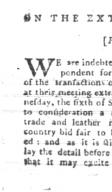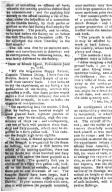[ On the Extraction of the Essence of Bark ] Dublin Society
Date: 1790/11/03
Source:
Nova Scotia Magazine
Institution: Nova Scotia Archives
| Source Origin: Nova Scotia Newspapers on Microfilm
| Reference: Microfilm Reels 8062, 8063
Instructions for tanning leather with bark, with a discussion of the economic benefits of American bark. nn.357_58. Microfilm Reel 8063.
ON THE EXTRACTION OF THE ESSENCE OF BARK.
[From the Londonderry Journal, of Sept. 19, 1736..]
WE are indebted to our kind corres-
pondent for the communication
of the transactions of the Dublin society,
at their meeting extraordinary, on Wed-
nesday, the sixth of September, to take in-
to consideration a matter by which the
trade and leather manufacture of this
country bid fair to be essentially benifit-
ed: and as it is still but in embryo, we
lay the detail before the public, in hopes
that it may excite some ingenious and
public-spirited persons to pursue the ex-
periment, and lay open the result, which
can be attempted on a small scale suffici-
ently exact to ascertain the merit of the
process.
The society, in their list of premiums,
offered the following:
The sum of one hundred pounds will
be given to provide bark and proper uten-
sils, and other charges attendant on expe-
riments for discovering an effectual me-
thod of extracting an essence of bark,
wherein the tanning qualities thereof shall
be concentrated: and for applying said
extract to the actual tanning a vat of lea-
ther, under the inspection of a committee
of the Dublin Society, by such person or
persons as the said society shall employ for
the purpose. The process, and its result,
to be laid before the society on or before
the first Thursday in December 1786. To
be adjudged the third Thursday in the
said month.
The list was sent by an eminent mer-
chant to a correspondent in America: and
in consequence, the following letter, &c.
was lately delivered to the society.
‘State of Rhode Island, Providence June
30, 1786.
‘BY the brigantine Happy Return,
Captain Thomas Dring, I have sent the
Dublin society a small sample of an ex-
tract from tanners’ bark. I was induced
to try the experiment, on my seeing a late
publication of the society, wherein they
expressed a wish, that some person would
make a trial towards reducing that article
into a less compass, in order to lessen the
expence of transportation.
On examining into the matter. I find,
that by boiling one hundred weight of
good ground bark, eighteen pounds of
essence may be extracted, nigh the con-
sistency of thick tar: and consequently,
one ton of bark will produce three hun-
dred and sixty pounds, which may be ex-
ported in a forty gallon cask. This redu-
ces the freight nigh seven eighths.
‘If, on trial, it should appear that none
of the strength is evaporated by the steam
in boiling, but that it still retains the
whole of the tanning qualities, there can
be no doubt but three hundred and sixty
pounds will answer the same purpose as a
ton of bark. The quantity sent you is
contained in a forty two gallon cask, boil-
ed to the state of melasses, and small
stone pot to the thickness of tar. The
samples should have been larger, had I
known sooner of this vessel’s going to
Dublin. If your tanners think with ours,
that it will answer the purpose intended,
your markets may hereafter be supplied
with large quantities from hence, and at a
more moderate price than at present.
‘Our tanners prefer hemlock [the name
of a particular species of oak], it being
much stronger, and I believe a much
greater proportion of essence may be ex-
tracted from the hemlock, than from the
oak bark.
‘The process is easy and very simple.
It may be affected by those who cannot
work at hard labour, and done back in
the country, where bark and fuel are both
plenty and cheap.
‘The methods I took in the above ex-
periment were as follow:
‘After weighing a sufficient quantity of
ground bark, I put it into iron kettles;
and after filling them with water, with
moderate boiling, extracted the whole of
the substance: then strained the liquor
into a vessel of brass, and after boiled it
away to the substance you have in the
samples. A person with proper appara-
tus, might have saved five hundred weight
in less time, and with less expence, than
the little quantity cost.
‘I am, Sir, &c.
In consequence of the foregoing letter,
an extraordinary meeting was immediate-
ly summoned, at which several eminent
tanners and experienced chymists attend-
ed. The extract of the bark was exami-
ned; and the master of the corporation of
tanners chearfully undertook to pursue
such process as was most likely to ascer-
tain its virtue: and several of the trade
promised to attend the operation. Should
the experiment induce an importation of
essence from America, besides obviating
the inconvenience frequently and severely
felt, for want of bark, it will greatly tend
to enlarge the exports of Ireland to Ame-
rica, as one of the greatest impediments to
our exports, was the difficulty of procu-
ring returns. Bark in substance, from the
nature of its stowage, would scarce be ad-
mitted on freight at three guineas per ton,
while the freight of a ton of essence, cost
of cask included, will scarce amount to
twelve shillings.
Download: Transcription | Images

